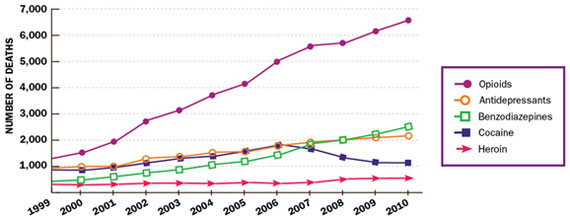Not all people experience the harsh judgement that recovering addicts undertake every time they walk into a room, especially when that room contains the one person that knows every detail of their medical history. Despite their extensive knowledge of disorders like addiction, many patients notice that physicians are quite crude when it comes to treating individuals with substance abuse disorders. Some believe this bias is acceptable, but other’s believe it’s beginning to negatively affect the health of recovering addicts.
The Opiate Epidemic
 cdc.gov
cdc.gov
First, it is important to understand the effects that substance abuse, specifically opiate abuse, has had on the United States within the past decade. Deaths due to opiate abuse have been steadily inclining within the past two decades, and the end is no where in sight. This epidemic effects every area of the states – urban, rural and even picture-perfect suburbia – and because of this, healthcare professionals that are not accustomed to addiction are faced with an unfamiliar challenge.
If a recovering addict walks into your office complaining of severe head aches, and you come to the conclusion that the individual is suffering from migraines, do you prescribe them a painkiller, or will they abuse it?
Addiction is a Chronic Disease
Unfortunately the answer to the question above isn’t a simple yes or no, considering every individual’s situation is different. Many experts within addiction programs believe that an addict is always an addict, and they are either in recovery or they have relapsed. While this may sound harsh, it’s a very important part of treating an addict.
Addiction is a chronic disease and there are both biological and environmental factors to consider when it comes to treating a recovering addict. A physician cannot simply prescribe a patient a drug if there is a significant chance they will abuse it, and because of this, the physician must assess the addicts current health and stage of addiction. Are they still in recovery? Have they had exposure to this drug since recovery began? And, so on.
Treating People with Addiction
So, how do physicians treat people with addiction? It’s a fine line to walk, physicians must proceed cautiously and with sensitivity, all the while ensuring they are not being taken advantage of. Nevertheless, prescribing a recovering addict with pain medication can feel wrong, even when it’s right. Here are a few tips to help facilitate this process:
- Make sure you are the only physician prescribing the individual medication. Unfortunately it’s far too easy for addicts to visit multiple physicians, allowing them to stock up on prescription pain medications.
- Prescribe medications bi-weekly. If an individual takes the same medication regularly, physicians often prescribe a few months at a time to limit office visits and other complications. Do not do this with a recovering addict, because it makes it easier for them to take advantage of the medication.
- Keep the dosage low. This will help keep the individual from building a tolerance, and feeling like they need more than what’s prescribed.
- Provide clear and concise directions. When should the individual take their medication, how often, etc… This will help keep the individual from popping a pill because they feel pain and it is not yet time for their next dose.
Acting as the primary care physician for a recovering addict can be difficult, but following simple rules like these can make it easier. If you believe that a patient is currently struggling with addiction, please reach out and help them.
